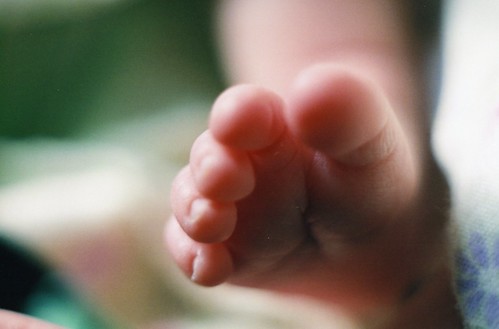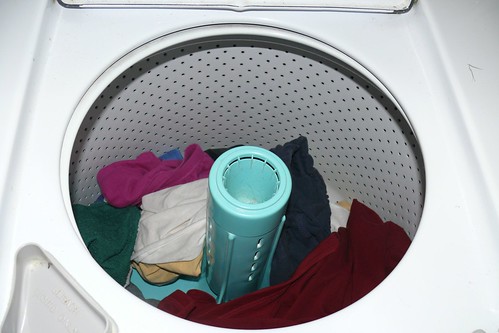"Feminism is the radical idea that women are people." -Rebecca West
This quote is meant to point out the very basic and commonsense basis behind feminism. Women are people, so they deserve to be treated like people.
A theme keeps emerging in the online conversations I've been a part of the last week: discussing both of those Atlantic pieces, participating in the Feministe discussion about Wurtzel's piece, debating whether you can be both an attachment parent and a free-range parent over at Free-Range Kids.
The theme is that many people seem to be glossing over the fact that children are also people. PhD in Parenting has an excellent post (you should go read it) about the compatibility of attachment parenting and feminism. In this post, the hierarchy of power comes up, and do you know who's on the bottom of that hierarchy? Children.
Yes, yes. Children are necessarily less capable of participating in many of the parts of society because they're not--you know--grown yet, but that doesn't make them less worthy of consideration as human beings.
PhD in Parenting explains that, when we put aside stereotypes about feminists and attachment parents and realize that they both stem from a perspective deeply informed by humanism, there is no conflict:

The theme is that many people seem to be glossing over the fact that children are also people. PhD in Parenting has an excellent post (you should go read it) about the compatibility of attachment parenting and feminism. In this post, the hierarchy of power comes up, and do you know who's on the bottom of that hierarchy? Children.
Yes, yes. Children are necessarily less capable of participating in many of the parts of society because they're not--you know--grown yet, but that doesn't make them less worthy of consideration as human beings.
PhD in Parenting explains that, when we put aside stereotypes about feminists and attachment parents and realize that they both stem from a perspective deeply informed by humanism, there is no conflict:
When examined from that perspective, it is no wonder that true feminists seek to break down the same hierarchies in their homes that they also seek to break down in society. Why would a woman who fights for equality and respect for herself then choose to parent in a way that doesn't respect her child's needs and personhood?

Traditional Views of Parenting
In that Free-Range Kids post, one commenter kept coming back to espouse the philosophy of John Rosemond, a "traditional" parenting advisor who I have heard of but haven't read, so I have to say that I'm really only capable of critiquing the commenters version of his parenting advice (though it's a version I've heard many times in many places).
But critique that I will.
This commenter continuously pointed out how damaging he thought attachment parenting was because it didn't teach the child to respect the parents. He insisted that children should not be "coddled" in the middle of the night because they need to be taught that they are just crying for want of attention and not because they have a true need. He went so far as suggesting that parents make a child's room inescapable and close the door, refusing to come back in until morning. He advises parents put babies in their cribs, close the door, and don't come back--no matter if the child is screaming--until their chosen time of waking. His basis behind this was because the spouse needs to come first.
He used the gender neutral language of "spouse" earlier, but later he started talking about how he knew an ideal couple where the young woman scaled back her photography business so that she could spend more time being a wife because she recognized that when her husband came home from work, his needs came first, before hers and before the child's.
I'm really not trying to get into a debate over whether cry-it-out or spanking or any other method of parenting is "okay," and I definitely think that you can respect your child without being an "Attachment Parent," but I can't pretend to be okay with the methods this man is advocating and the reason is simple: these methods do not treat a child like a human.
It is this traditional philosophy that brings us ideas that children should be seen and not heard and that children should not get any say in household decisions.
It is this traditional philosophy that brings us ideas that children should be seen and not heard and that children should not get any say in household decisions.
Sure, a child crying out in the middle of the night might not need something in the sense that s/he will die without it, but that doesn't mean that the child doesn't need something in the sense that s/he is feeling legitimate emotions worthy of attention and respect. The idea that infants are manipulators trying to run their world through terror may be appealing (trust me, I know it can seem that way), but they're just people trying to express themselves without the benefit of language, experience, and established social norms. They're learning, and it's our job as parents to teach them. The lesson that I want to teach is not "If I don't think your needs are worthy of attention, then they are not needs" but rather "You have a right to your needs and the expression of them, and I will listen."
Seeing Children as People in the Feminist Sphere
So it's really no surprise to me that someone who ascribes to the "traditional" hierarchy that PhD in Parenting discusses would make decisions that limit the humanity of both women and children, but what does surprise me is the way that children still get relegated to the bottom rung even within feminist discussions.
Time and time again I have seen the feminist discussion of the role of mothers fail to take into account children as people.
The Wurtzel piece is the most obvious as she meticulously defines feminist goals as economic goals and then goes to great lengths to insist that motherhood is not worthy of economic consideration. But at least with Wurtzel, the demeaning and narrow view of mothers is straightforward. It frustrates me more when I see this view of children come up more subtly in feminist discussions of women's work.
Way, way, too often, I see mothering lumped in with all of the other chores of housekeeping that women are unfairly burdened with.
I understand how it can happen. Women are also unfairly burdened with the responsibilities of parenting, and that can also hinder their ability to enter into work outside of caregiving, but that does not mean that raising a child is in the same category as scrubbing toilets and doing laundry. Raising a child is not a chore to be overcome (or even ignored). Raising a child is a human relationship that should be valued for that reason.
Of course, men should also value the human relationships they form with their children (and they do, and I think we have to talk about how traditional gender roles unfairly devalue the parent-child relationship for men too, often in ways that leave them less access to those relationships).
Of course there are a lot of chores that come along with children that didn't have to be done before: diapers, bathing the child, cooking, washing bottles, extra laundry. And yes, the burden of those extra chores from childrearing (which all too often fall squarely on the woman's shoulders) need to be examined for equity. We can lump those in with the other household chores and have a discussion about the division of household labor and the value of that work and whether women should just refuse to do it to make a point, etc.
But we cannot do that to parenting. Parenting a child goes way, way beyond changing diapers and washing tiny clothes, and to act as if that bond, that relationship is simply one more checkmark on a list of chores to be accomplished in a day, one more barrier to women's equality in the economic sphere (the only sphere that counts, apparently) lowers children to a status that is subhuman.
And children are people, too.
Photo: sabianmaggy, .Larry Page


This is a fantastic post!
ReplyDeleteThis is such a wonderful post. Thank you for putting into words the incoherent half-baked thought that's been banging around in my head the last few days as these various articles have been coming out: Children are people! And people deserve respect.
ReplyDeleteYES! THANK YOU!
ReplyDeleteYup, as always I totally agree with you! I know a lot of people have said it before me, but if you substitute "spouse" - or even "house guest" for "child" in a lot of that parenting advice it sounds absolutely abhorrent!
ReplyDeleteI think one problem for the US is that other countries address these inequalities (to a greater and lesser degree) by instituting payment systems for the sick, injured, elderly, those providing care etc etc. In the USA you call that communism :(
(no, not all of you, I know!)
Right! We don't think it's okay to treat any other human being like that, so why is it okay to treat children (who we're supposed to be teaching about how the world works) that way?
DeleteAs for the paid caregiving: sigh. I don't see any solutions to that on the nearby horizon.
AMEN!
ReplyDeleteI always use this very same argument when people tell me things like "you should keep your kids under control" if they're talking loudly in public or some such thing. That kid is a PERSON. You were that age once too. And that kid is just talking. You'd find me incredibly rude if I told you that you needed to put away your cell phone because you're disturbing the non-businessmen in the room, right? So why is this different?
I've thought about that a lot, too. I try really hard to make sure my daughter is "well behaved" in public. I never let her run around and disrupt people or knock things over or things like that. But she's a toddler, so she can be loud (even when she's perfectly happy) and I've gotten some mean looks for it (not often, most of the time people are very nice). But what do they want me to do? Tell her she can't babble with happiness because it's loud? In a restaurant where every adult around her is talking? She's just learning to communicate, too.
DeleteHave you talked to Penny Weiss about this? She is working on a book about this and it could be fun to talk with her.
ReplyDeleteI didn't know that! I should definitely try to meet up with her about it. I'd love to hear her thoughts.
ReplyDelete